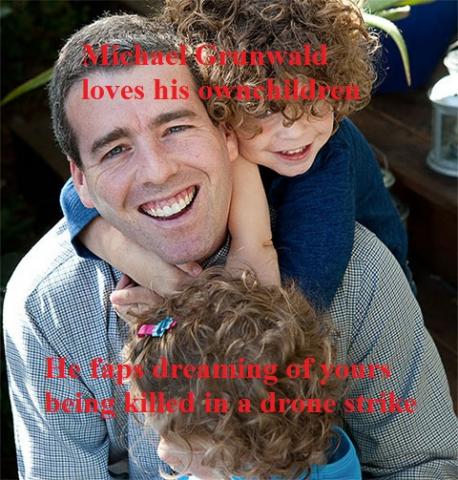Mainstream media icons defend conviction and murder of investigative journalists without trial
Mainstream writers are obviously feeling their loss of prestige, power and authority. Two weekend incidents illustrate the condescension and outright bloodthirstiness that lurks in the deaths of some of their minds. A senior national reporter for Time Magazine exhorted the government to extrajudicially murder Julian Assange via drone strike while a reporter at the UK Observer Magazine, conflated “journalist” with “hacker” and “charged” with “convicted.” The Observer is a weekly news magazine owned by the Guardian. One case displays a callous disregard for human life, the other a seemingly reckless disregard for the truth.
Michael Grunwald, the senior national reporter for Time Magazine, tweeted at 4:25pm Saturday, August 17 “I Can't Wait to write a defense of the drone strike that takes out Julian Assange.” If such a drone strike were to happen at the present time, it would be inside the Ecuadorian embassy in London, would likely kill Ecuadorian diplomatic personnel, and possibly kill Britons that work on the 5th and 7h floors of office building which houses it. No thought was given to passersby on the busy London street outside. The lives of those people also don't matter to Grunwald, as long as his journalistic competition, who is not a combatant under arms, gets killed.
That Grunwald feels he needs a mass killing on a busy street to eliminate his competition is unsurprising, considering his self-description as “another middle-aged hack” in his most recent article for Time. The article, which glossed over the CIA's role Jeff Bezos' buyout of the Washington Post, laments the death of journalism in the internet age, not because of a lack of good journalism, but because of a lack of a business model to deliver it. Grunwald never questions the mainstream media's ability to actually delivery a product that people will buy. So long as Assange is dodging drones and Barrett Brown is awaiting trial while facing a gag order, so called journalists can feel free to solicit government mass murder so they will have something to defend in print, and thus nothing to actually investigate.
Time Magazine has not disciplined Grunwald, although it made a terse statement to the Huffington Post that seemed to defend him: "Michael Grunwald posted an offensive tweet from his personal Twitter account that is in no way representative of TIME's views. He regrets having tweeted it, and he removed it from his feed." Grunwald did delete the tweet, but not as a retraction based on conscience: “Fair point. I'll delete. @rober1236Jua my main problem with this is it gives Assange supporters a nice safe persecution complex to hide in.”
The other great attack on journalists of the day came from the UK Observer, the weekly news magazine published by the Guardian. Award-winning fiction writer turned features writer Carole Cadwalladr wrote a review of a new book on Anonymous by Pammy Olson titled “We are Anonymous.” Her review ended in a bullying warning to hackers, journalists and whistle blowers: “Here is the biggest takeaway: if you're going to be a hacker, kids, get the hell out of America. Jake Davis, aka Topiary, has now served his sentence and is free, whereas Barrett Brown, who has pleaded guilty to hacking into Stratfor, a private intelligence agency working for the US government, is potentially facing a 100-year sentence. But then the battle of the internet versus the nation state is only just beginning.”
Cadwalladr clearly laments that Olson does not write award-winning fiction when she penned “It is such a great detective thriller that it's a shame that there's not more about the investigative process itself.” Cadwalladr may need that brush up on the investigative process, as the Guardian's editorial staff had to retract her entire concluding paragraph and replace to note that she meant Jeremy Hammond, and that Hammond is awaiting sentencing where he faces 10 years for the crime she pinned on Barrett Brown. Perhaps the Guardian will assign Cadwalladr to write fiction again, as she is clearly qualified.
The business of getting the news out in post-constitutional America is hard enough with threats of government suppression, actual government suppression and a compliant corporate media that bows to a president's compulsive lies. We don't need mainstream hacks to write about hackers, or fiction writers to whistle past graveyards that are filling with whistle-blowers.

